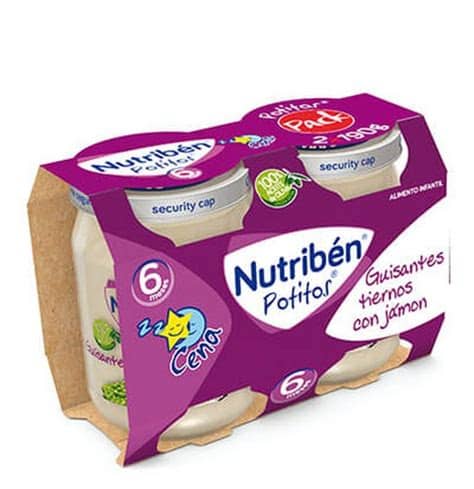The 6 Healthiest and Most Nutritious Baby Food Purees for Your Baby in 2025
Published content: September 23, 2025
When the time for complementary feeding arrives, one of the biggest concerns for parents is choosing the right foods for their little ones. We want the best for them: products that are healthy, nutritious, and help them grow strong and healthy. In this regard, commercial baby food pouches have become a practical and safe solution for many families, especially when time is short or we are away from home. However, not all baby food is created equal. The market is flooded with options, and knowing how to discern which ones are truly beneficial can be a challenge. Therefore, it is vital to learn how to read labels, understand the ingredients, and opt for those that do not contain added sugars, salts, artificial preservatives, or unnecessary fillers. The World Health Organization (WHO) and the Spanish Association of Pediatrics (AEP) recommend a varied diet, with natural flavors and textures appropriate for the baby's age, something that many healthy baby food brands take into account.
The transition from milk to solid foods is an exciting milestone for both the baby and the parents. It's time to introduce a palette of flavors and textures that will influence the child's future eating habits. Baby food pouches can be an excellent tool at this stage, as long as they are chosen with care. The best baby food pouches on the market are distinguished by their composition: they are usually made with organic or bio ingredients, which guarantees the absence of pesticides and other chemicals. In addition, many quality brands use steaming methods to preserve essential nutrients, such as vitamins and minerals, as much as possible. Another fundamental aspect is variety. It is important to offer the baby a wide range of flavors, from vegetable purees like carrot or pumpkin, to combinations of fruits and proteins like chicken or lentils. This not only helps them accept new flavors but also contributes to complete sensory development.IMAGEN_R
Choosing the right baby food is not just a matter of convenience, but also of health and well-being. Superior quality baby food acts as a reliable source of nutrition, complementing breast milk or formula and ensuring that the baby receives all the macro and micronutrients it needs for its growth. In this guide, we will focus on the 7 best-rated baby food pouches on the market for their composition, ingredient quality, and the absence of unwanted additives. We will provide you with a detailed overview of why these products stand out and how they can be an excellent option for your baby's diet in 2025. From single-ingredient purees for the first months to more complex blends for older babies, this comparison will help you make an informed decision and feel confident that you are offering the best to your little one.
The infant food industry has evolved significantly in recent years, with a growing focus on transparency and quality. Reputable brands are adopting sustainable practices and prioritizing the baby's well-being above all else. But how do you know which ones are really the leaders in this category? We will analyze aspects such as the origin of the ingredients, the manufacturing process, the absence of common allergens, and the opinions of other parents. Understanding these features will allow you to go beyond marketing and choose products that truly provide nutritional value. We encourage you to explore this guide and discover how baby food pouches can be a positive and healthy part of your baby's diet, always as long as they are chosen with the right knowledge. Get ready to take the first step towards a successful and nutritious complementary feeding journey for your little one!
Analysis and Reviews of the Best Baby Food Purees of 2025
If you're thinking of buying baby food pouches for your baby, let me tell you that not just any brand will do. Each one has different qualities that you should understand before deciding on one or the other. But don't worry, because I have created a list of the best purees, based on their quality, features, and strengths. Take 5 minutes and find the one you need.
1. GERBER Organic Baby Food Purees
Recommended for parents looking for a convenient, safe, and nutritious complementary feeding option. Ideal for the first months of a baby's life and for parents who value organic ingredients and brand transparency.
What distinguishes the GERBER Organic line is its commitment to the Clean Field Farming® philosophy. This agricultural practice ensures that ingredients are grown in dedicated fields with high quality standards, minimizing exposure to contaminants. The result is fruits and vegetables that maintain their flavor and nutritional value. Parents can feel at ease knowing that each jar or pouch is made with ingredients that have undergone rigorous quality controls, from the seed to the final product. This is fundamental for a baby’s developing digestive system and body, as it minimizes exposure to pesticides and other chemicals that can be harmful in the long term.
The variety of the range is another of its strengths. GERBER Organic offers a wide range of flavors, from single-ingredient purees for babies who are starting complementary feeding, to more complex and chunky mixes for those who are in more advanced stages. This progression helps the baby explore new textures and develop their palate naturally. Innovative combinations are included, such as apple, carrot, and blueberry, or pear, pumpkin, and spinach, which ensure the baby does not get bored and receives a balanced diet. This diversity also encourages the acceptance of new foods, a common challenge in childhood.IMAGEN_L
One of the most valued aspects by parents is the absence of unnecessary additives. GERBER Organic purees are characterized by not containing added sugars or salt. The sweet flavor, when present, comes exclusively from the fruits, which is vital to prevent the baby from developing a preference for artificial flavors and to protect the health of their little kidneys. The only “preservative” used is vitamin C, which, in addition to being an essential nutrient, helps maintain the natural freshness and color of the food. This focus on ingredient purity is a decisive factor for many parents who seek an option as close as possible to homemade food.
In addition to the quality of the ingredients, the manufacturing process is key. The purees are steam-cooked to preserve the maximum amount of vitamins and minerals. This gentle cooking method ensures that the final product is highly nutritious. The GERBER Organic line has received purity awards, such as the Clean Label Project Purity Award, which certifies that the products are tested for more than 400 contaminants, including heavy metals and pesticide residues. This type of certification adds an extra layer of trust for consumers, demonstrating that the brand not only promises purity but also validates it through an independent third party. It is a point that differentiates the brand in a very competitive market.
PROS
CONS
2. Smileat - Baby Jar
Recommended for parents who prioritize 100% organic, locally sourced ingredients and total brand transparency. Ideal for those looking for an option that is as similar as possible to homemade food.
In a baby food market that is increasingly aware of product quality and origin, Smileat has established itself as a benchmark for organic baby food. Born from the vision of a group of entrepreneurs, the brand stands out for its unwavering commitment to organic farming, sustainability, and transparency. Their baby jars are not just purees; they are the result of a philosophy that prioritizes pure and natural ingredients, grown in an environmentally friendly way, and processed in the simplest possible way to preserve their nutritional value.
The first thing that catches the attention of parents when they learn about Smileat is its promise to use 100% organic ingredients. Unlike other brands, Smileat not only certifies its products but also prides itself on its short supply chain business model. This means they work directly with local farmers and ranchers, ensuring the freshness of the ingredients and reducing the carbon footprint associated with transportation. For parents looking for local options, this is a key feature. The result is simple recipes, with a short and completely recognizable ingredient list, which generates great trust, as it is easy to know exactly what you are giving your little one. From fruit purees to vegetable and protein combinations, each jar is designed to reflect the purity and natural flavor of its components.
In addition to its ecological commitment, transparency is a pillar of the brand. Smileat hides nothing. On its website and packaging, detailed information can be found about the origin of its ingredients and its manufacturing process. This honesty is particularly valued by today's parents, who research every product before buying it for their children. The brand has also received important quality certifications, which validate its dedication to purity. Its products are rigorously tested to ensure the absence of pesticide residues and other contaminants, providing total peace of mind. This level of detail is a testament to Smileat's commitment to child health and well-being.IMAGEN_LSmileat's product range is varied, but it follows a line of simplicity and quality. They offer single-ingredient jars for babies who are starting complementary feeding, allowing them to familiarize themselves with flavors individually. As the baby grows, the brand introduces more elaborate mixes, such as chicken with carrot, rice with vegetables, or fish with peas, always maintaining the philosophy of homemade recipes, without unnecessary additives. It is important to note that their purees contain no added salt, sugar, or preservatives, which is vital for the baby's kidney health and for fostering a palate that gets used to the natural flavors of foods from an early age.
In terms of practicality, Smileat's glass jars are very convenient. They are easy to heat and serve, and their format allows them to be stored in the refrigerator once opened. Although they are not as light as pouches, glass is a more sustainable and safe material for storing food, as it does not transfer chemicals to the product. The shelf life of these purees is also an advantage, allowing parents to always have a healthy and quick option on hand, ideal for emergencies or for those days when there is no time to cook. Despite all these advantages, the price of Smileat products is higher than that of conventional purees, which can be a factor to consider for some family budgets.PHRASE_CIn conclusion, Smileat has established itself as a brand that goes beyond being purely organic. Its business model is based on trust, transparency, and real quality, offering parents a feeding option that reflects a deep commitment to the baby's health and the environment. While its price may be a drawback, the safety and purity of its ingredients make the investment worthwhile. It is the perfect choice for those who do not want to make concessions in their children's nutrition and are looking for products that feel as authentic as homemade food. It is an example of how a brand can grow and succeed based on solid values and a high-quality product.
PROS
CONS
3. Hero Baby Purees
Recommended for parents who are looking for a brand with a wide variety of products and an excellent quality-price ratio. Ideal for those who trust a company with a long history in the market.
Hero Baby is, without a doubt, one of the most iconic and recognized brands in the infant nutrition market. With a history spanning decades, their Hero Baby purees have become a fundamental pillar in the diet of millions of babies. The brand has earned the trust of parents thanks to its constant commitment to quality, food safety, and a wide variety of recipes that adapt to the nutritional needs of each growth stage. Its philosophy is based on offering products that combine the tradition of homemade food with the convenience and safety of a rigorously controlled, industrialized product.
One of the greatest appeals of Hero Baby purees is their extensive product range. The brand offers an almost unmatched variety, with options ranging from single-ingredient purees for the youngest babies, to more elaborate menus that combine cereals, meat, fish, and vegetables for older ones. This diversity makes it easy for parents to introduce new flavors and textures gradually, helping the baby develop their palate and accept a varied diet. The recipes are formulated by experts in infant nutrition and are updated to comply with the recommendations of major health organizations, such as the World Health Organization (WHO) and the Spanish Association of Pediatrics (AEP). It is a brand that has managed to remain relevant by offering both timeless classics and more modern and healthy options.IMAGEN_RIngredient quality is a central pillar in Hero Baby's production. The brand uses carefully selected raw materials, and many of its products are made with locally sourced ingredients, which supports the regional economy and ensures freshness. The purees undergo strict quality controls at all stages of production, from the farm to the final jar. This guarantees the absence of pesticide residues and other contaminants. Hero Baby has also strived to reduce the use of added sugars and salt in its recipes, prioritizing the natural flavor of foods. Many of their purees are made without added salt or sugars, which is vital for a baby's kidney health and for developing good eating habits. This is a point that nutrition-conscious parents value enormously.
Despite its focus on quality, Hero Baby purees are known for their excellent quality-price ratio. This makes them accessible to a wider audience, which is one of the reasons why the brand has maintained its leading position in the market. They offer an affordable option without compromising safety or nutrition, which is a great advantage for families looking for a practical and trusted solution for complementary feeding. The presentation in glass jars is another aspect that many parents appreciate, as glass is an inert material that does not react with food and is recyclable. The jar format also allows the product to be heated evenly and stored safely once opened, which prevents waste.
While the brand has many advantages, it is important to note some differences compared to other more premium options. Although Hero Baby has reduced sugars and salt, some of its recipes may contain added starches or thickeners, something that more 'organic' niche brands tend to avoid. Furthermore, the texture of some of their purees can be very homogeneous and uniform, which may not be the best option to stimulate the development of chewing in the more advanced stages of complementary feeding. However, for the first months, this texture is ideal. The true value of Hero Baby lies in its ability to combine tradition, accessibility, and solid quality in every product it offers.PHRASE_CIn summary, Hero Baby purees are a classic and reliable option. Their wide variety of flavors, their excellent quality-price ratio, and the trust inspired by their long history make them a safe choice for parents. While some recipes may have ingredients that other more niche competitors avoid, their overall commitment to baby nutrition and safety is undeniable. It is the perfect choice for those looking for a proven brand that has always been there, offering a practical and nutritious solution for every stage of their child's feeding journey. It is a pillar of the industry that has managed to evolve without losing its essence.
PROS
CONS
4. Nestlé Baby Food Purees
Recommended for parents who are looking for a brand with maximum accessibility and a wide variety of products. It is ideal for those who trust a leading company with a long history.
Nestlé is one of the largest and most long-standing corporations in the food industry, and its line of Nestlé Baby Food Purees has been a fundamental pillar in infant nutrition for decades. The brand has earned its leadership position thanks to a combination of vast experience, a scientific rigor in the formulation of its products, and an almost ubiquitous presence at points of sale. For many parents, Nestlé is the first choice they turn to, not only for its recognition but for the trust projected by a company with such a consolidated history in the infant food sector.IMAGEN_COne of the greatest strengths of Nestlé baby food is its accessibility and variety. They can be found in virtually any supermarket or pharmacy, and their recipe catalog is one of the most extensive on the market. The brand offers a great diversity of flavors and textures, adapted to each stage of the baby's development. From single-ingredient purees for the first months to complex mixtures that combine a variety of meats, fish, vegetables, and cereals. This wide range makes it easy for parents to introduce new foods gradually, ensuring that the baby receives a varied and balanced diet. Recently, Nestlé has innovated with its Natural Selection line, which focuses on simpler recipes with high-quality ingredients, reinforcing its commitment to a purer and more natural diet.
Nutritional innovation is another pillar of Nestlé's philosophy. The company continuously invests in research and development to improve its formulas and adapt them to the latest pediatric recommendations. Their purees are formulated to provide an adequate nutritional profile for each growth stage, including iron, zinc, and essential vitamins. Additionally, Nestlé has worked to reduce the salt and sugar content in its products, an effort that aligns with public health guidelines to combat obesity and foster healthy eating habits from infancy. The rigorous quality controls to which its products are subjected, from the selection of raw materials to the final product, guarantee the safety and purity of the food that reaches the baby's table.
However, despite the advantages, it is important to consider some aspects. Given its size and mass-market approach, some critics point out that the brand may not be as specific in its use of 100% organic ingredients as smaller, niche competitors are. Although Nestlé offers an organic line, its main focus remains large-scale production. This does not affect the safety or quality of the product, but it does differentiate it from brands that center their entire philosophy on "organic" and local. Nestlé's main advantage lies in its ability to offer high-quality, safe, and competitively priced products, which makes them accessible to the vast majority of families. It is a difficult balance to achieve, and Nestlé has perfected it over the years.PHRASE_CNestlé purees are not only convenient due to their wide availability but also their format. The glass jars are ideal for an individual serving, easy to heat, and perfect for travel. Their long shelf life without the need for refrigeration before opening makes them a practical solution for any food emergency. The trust that parents place in Nestlé is a reflection of its history, its consistency, and its ability to evolve over time, adapting to new market and consumer demands. It is a brand that has managed to maintain its relevance, despite the growing competition from smaller, specialized brands. Its commitment to infant nutrition is undeniable, and it is demonstrated in each of its products.
In conclusion, Nestlé baby food is a classic and reliable option. Its maximum accessibility, the variety of its offer, and the trust of a leading brand make it a safe choice for any baby's diet. While not all of its lines are 100% organic, its commitment to safety, nutrition, and constant improvement makes them a solid choice. It is the perfect choice for parents who are looking for a quality product from a brand that has proven to be a fundamental pillar in the nutrition of the little ones for generations. Nestlé represents the safety and convenience of a global brand, adapted to local needs.
PROS
CONS
5. HiPP Baby Purees
Recommended for parents who prioritize 100% organic ingredients, sustainability and a rigorous quality control for their baby's nutrition.
In the world of baby food, the HiPP brand stands out as a true pillar of the organic movement. Since Georg HiPP began with organic farming in the early 20th century, the company has maintained an unwavering commitment to producing 100% organic foods. HiPP Baby Purees are not just a product; they are the result of a philosophy that places nature and purity at the center of everything. For parents looking for the highest quality and safety in their baby's diet, HiPP represents a trustworthy choice, backed by decades of experience and a rigor that goes beyond EU standards.
One of HiPP's greatest distinguishing features is its focus on 100% organic ingredients. The company does not just comply with organic farming regulations. In fact, its own quality criteria are even stricter. They perform over 1,200 tests for harmful substances on each batch, a level of scrutiny that is almost unmatched in the industry. This ensures that each jar is free of pesticides, nitrates, and other residues that might be present in conventional farming. The result is purees that are not only safe but also retain a more authentic and natural flavor, making it easy for the baby to get used to the pure tastes of fruits and vegetables from an early age. This is a crucial advantage for developing a healthy palate and for preventing a preference for artificially sweet or salty flavors.IMAGEN_CThe HiPP Bio product range is exceptionally broad and designed for every stage of development. They offer single-ingredient options for the first months of complementary feeding, such as carrot, apple, or pumpkin purees. As the baby grows, the variety expands to more complex mixtures that include combinations of vegetables, meats, fish, pasta, and cereals, always with optimal nutritional balance. Furthermore, the brand has strived to offer different textures to aid in the transition to solid foods, including purees with small pieces. This commitment to texture innovation is essential for the development of the baby's oral motor skills. HiPP has also developed gluten-free and lactose-free products, catering to the needs of babies with allergies or intolerances.
In addition to the quality of its ingredients, HiPP's commitment to sustainability is another of its pillars. The company works closely with organic farmers, supporting biodiversity and responsible agriculture. Its packaging, mostly glass, is recyclable, and the company invests in projects to reduce its carbon footprint. This environmental responsibility resonates with parents who seek brands that reflect their own ecological values. Choosing HiPP is not just a nutrition decision, but also a statement of principles about caring for the planet.
On the other hand, it is important to mention that HiPP's quality and organic focus come with a higher price compared to conventional baby food brands. This can be a barrier for some families. Furthermore, although the brand is widespread, its availability in certain points of sale may be limited, sometimes forcing parents to look for its products in specialized stores or online.PHRASE_CIn conclusion, HiPP Bio purees are one of the safest and most environmentally friendly options in the baby food market. Their strict quality control, which goes beyond regulations, and their dedication to pure and natural ingredients make them an excellent choice for parents who do not want to compromise on their children's diet. Although their price and availability may be an obstacle for some, the peace of mind and nutritional benefits they offer are worth the investment. HiPP represents the ultimate organic quality, with a flavor that honors nature in every spoonful. It is the perfect option for those who seek the best of the best, with a focus on sustainability and long-term health.
PROS
CONS
6. Nutribén Baby Food Purees
Recommended for parents looking for a brand with a proven track record in infant nutrition. Ideal for those who prioritize the use of high-quality ingredients, with no palm oil, and are looking for a great variety of traditional recipes.
When we talk about baby nutrition, Nutribén is one of the brands that resonates most strongly in the minds of Spanish parents. With a long history of commitment to infant nutrition, Nutribén baby food purees have earned the trust of generations thanks to their focus on quality, variety, and innovation. The brand has remained faithful to its mission of offering foods that are as similar as possible to those prepared at home, using carefully selected ingredients to ensure the maximum benefit for the baby's development.
One of the greatest hallmarks of Nutribén purees is their wide range of recipes, which adapts to the different stages of complementary feeding. From the first single-ingredient fruit and vegetable purees, ideal for babies starting their solid food adventure, to more complex combinations with meat, fish, or legumes for older babies. This variety not only ensures that the baby receives a balanced diet but also encourages exposure to different flavors and textures, a crucial step for the development of a versatile palate. The recipes, often inspired by traditional cuisine, are a plus for those parents who want to introduce their children to familiar flavors, but with the guarantee of safety and quality controls of an industrial product.IMAGEN_R
Nutribén's philosophy focuses on the use of high-quality ingredients. The brand is transparent about the origin of its raw materials and its manufacturing process. Many of its purees are made with a steaming process, which helps preserve essential nutrients such as vitamins and minerals as much as possible. In addition, a highly valued aspect is the fact that Nutribén has been a pioneer in the elimination of palm oil from its formulas, a commitment that responds to consumer concerns about health and sustainability. The use of olive oil in many of its preparations is a seal of quality that connects with the Mediterranean diet, recognized worldwide for its health benefits.
Another key point in the trust that Nutribén generates is its rigorous quality control. Each jar is subjected to multiple tests to ensure that it meets the highest food safety standards. This includes the absence of preservatives, colorings, added sugars, and salt. The brand understands that the baby's palate does not need these additives to enjoy food, and its priority is to offer pure and simple nutrition. In a market flooded with options, this transparency and commitment to the baby's health are a decisive factor for many parents. The Nutribén product line also includes gluten-free options, which makes it suitable for babies with celiac disease or gluten sensitivity, demonstrating its adaptability to the specific needs of each child.
The convenience of Nutribén baby food purees is undeniable. They are a practical solution for meals away from home or for those days when time for cooking is limited. The glass jars and, in some cases, flexible pouches, facilitate their transport and storage. The screw cap of the jars ensures that the product remains fresh once opened in the refrigerator, allowing you to use the necessary amount and save the rest without problems. Although they are a fantastic tool, it is important to remember that they should be a complement to the baby's diet, not a total substitute for homemade food. The variety of textures and flavors of homemade foods is irreplaceable for the child's sensory development and their long-term relationship with food.PHRASE_CDespite its tradition, the brand has not stopped innovating. They are constantly developing new recipes and improving their formulas to be at the forefront of infant nutrition. Their commitment to research and development is what allows them to offer products that are not only safe but also nutritionally optimized for each stage of growth. For example, their purees with cereals or legumes are designed to provide a suitable source of energy and protein for the growing baby. In conclusion, Nutribén remains a solid and reliable option in the world of complementary feeding. Its balance between tradition, quality, and convenience makes it a fundamental pillar in the nutrition of babies today.
PROS
CONS
Comparison of Healthy Baby Food Purees
1. GERBER Organic Baby Food Purees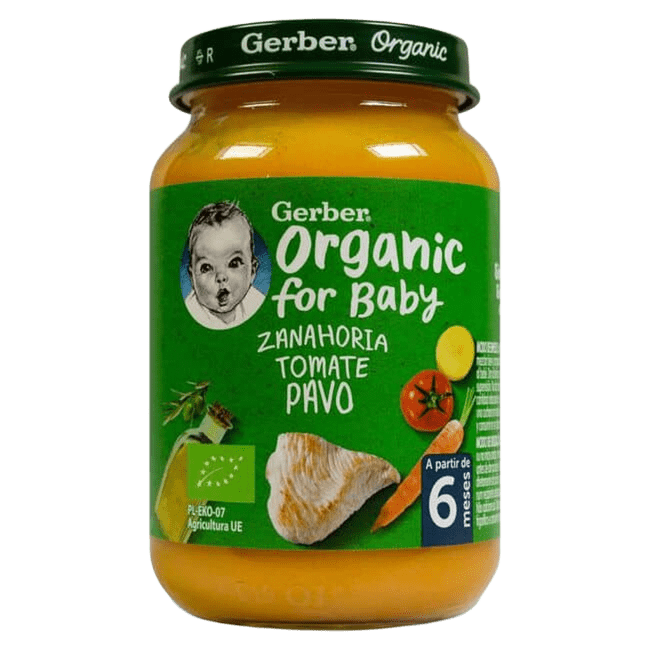 | Organic Ingredients Wide Variety of Flavors No Harmful Additives Convenience and Portability | Higher Price Potential Contaminants | |
2. Smileat - Baby Jar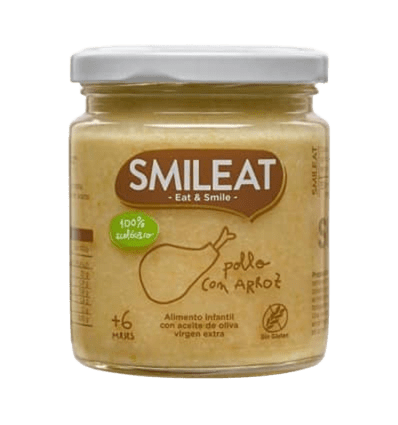 | 100% Organic Ingredients Total Transparency Simple and Natural Recipes Commitment to Sustainability Quality Certifications | Higher Price | |
3. Hero Baby Purees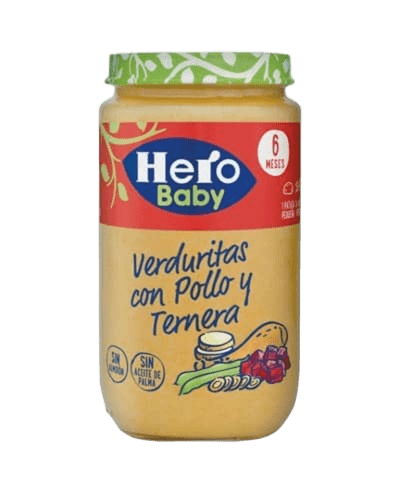 | Wide Variety Excellent Quality-Price Ratio Long History and Trust Nutritionally Balanced | Very Homogeneous Texture Some Added Starches Non-Ecological Packaging | |
4. Nestlé Baby Food Purees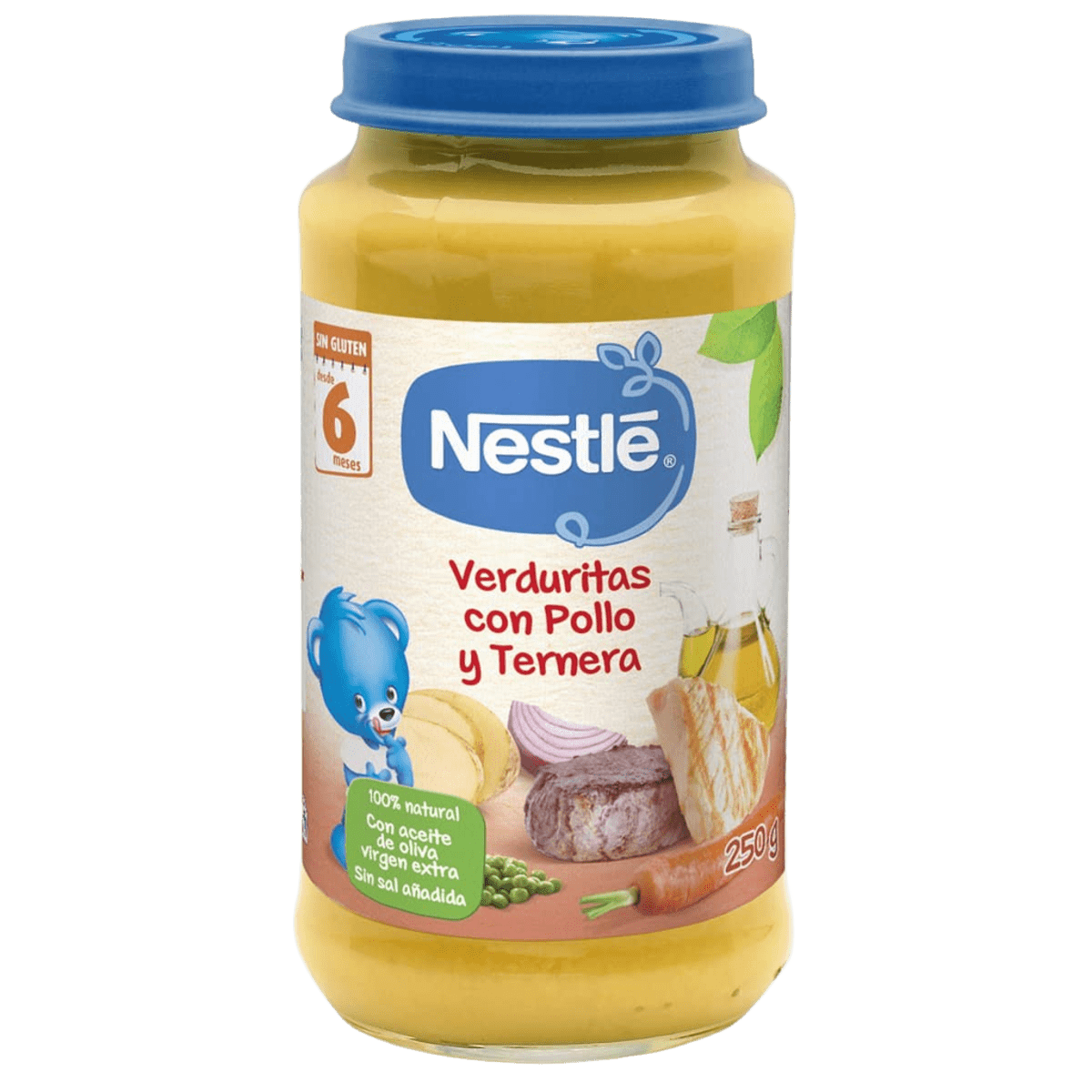 | Maximum Accessibility Wide Range of Flavors Long History and Trust | Some Varieties Are Not 100% Organic | |
5. HiPP Baby Purees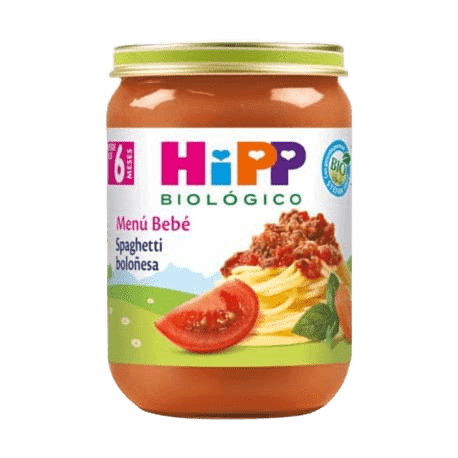 | 100% Organic Ingredients Strict Quality Controls Wide Range of Organic Flavors Commitment to Sustainability No Unnecessary Additives | Higher Price Limited Availability | |
6. Nutribén Baby Food Purees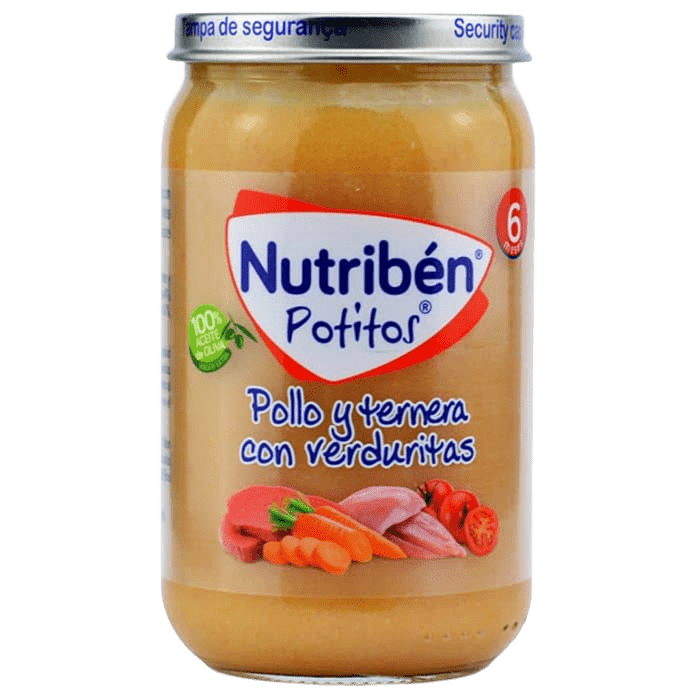 | Variety of Recipes No Palm Oil History and Reliability | Moderately High Price Availability | |
1. GERBER Organic Baby Food Purees | |
 | |
Organic Ingredients Wide Variety of Flavors No Harmful Additives Convenience and Portability | |
Higher Price Potential Contaminants | |
2. Smileat - Baby Jar | |
 | |
100% Organic Ingredients Total Transparency Simple and Natural Recipes Commitment to Sustainability Quality Certifications | |
Higher Price | |
3. Hero Baby Purees | |
 | |
Wide Variety Excellent Quality-Price Ratio Long History and Trust Nutritionally Balanced | |
Very Homogeneous Texture Some Added Starches Non-Ecological Packaging | |
4. Nestlé Baby Food Purees | |
 | |
Maximum Accessibility Wide Range of Flavors Long History and Trust | |
Some Varieties Are Not 100% Organic | |
5. HiPP Baby Purees | |
 | |
100% Organic Ingredients Strict Quality Controls Wide Range of Organic Flavors Commitment to Sustainability No Unnecessary Additives | |
Higher Price Limited Availability | |
6. Nutribén Baby Food Purees | |
 | |
Variety of Recipes No Palm Oil History and Reliability | |
Moderately High Price Availability | |
How to Choose the Healthiest Baby Food: A Buyer's Guide
In addition to the ingredient list, the origin of the ingredients is another point to consider. Choosing products with organic certifications, such as the “bio” or “organic” label, ensures that the foods have been grown without pesticides or synthetic fertilizers, which is especially important in infant nutrition. The texture and age stage for which the baby food is designed are also vital. Purees for the first months should be very smooth and homogeneous, while for older babies, thicker textures with small chunks are recommended to stimulate chewing and the transition to solid foods. Considering these aspects will allow you not only to choose a high-quality product but also to promote healthy development in your little one.
The Importance of Organic Ingredients in Baby's Diet
Organic farming also promotes biodiversity and sustainability, which benefits the environment. By choosing baby food with organic ingredients, you are not only taking care of your baby's health but also supporting more responsible agricultural practices. It is important to remember that a baby's digestive system and organs are still developing, which makes them more vulnerable to environmental toxins. Therefore, offering them chemical-free foods is one of the best investments in their long-term health. Look for reliable certification seals on the packaging, such as the European Union's eco-product seal. This simple act can make a big difference in the quality of nutrition you provide your little one.
Avoiding Sugars and Salt in Baby Food
Added sugars, on the other hand, not only contribute to childhood obesity and dental problems but also displace other essential nutrients in the diet. When choosing baby food, it is crucial to check the label and make sure they do not contain “sucrose,” “fructose,” or corn syrups, which are forms of added sugar. The sweet flavors in fruit purees should come exclusively from the fruit itself. Opt for single-ingredient purees at first so the baby can experience the real taste of each food. Teaching the baby to enjoy the natural flavors of fruits, vegetables, and cereals from an early age is the best gift you can give them for their future health. The best way to avoid these ingredients is to choose brands that are transparent about their composition and focus on the purity of their recipes.
The Importance of Variety in Baby's Diet
Variety also ensures that the baby receives a complete range of essential nutrients. Each food has a unique nutritional profile: vegetables provide vitamins and minerals, fruits are rich in antioxidants, and protein is vital for muscle growth. Baby food that combines different food groups, such as meat with vegetables or cereals with fruits, can be an excellent way to ensure a balanced intake. Furthermore, early exposure to different flavors can reduce food neophobia (the fear of trying new foods) later in childhood. Therefore, don't limit yourself to just a few flavors that you know your baby likes. Explore, experiment, and introduce new baby foods regularly to foster an adventurous palate and complete nutrition.
Frequently Asked Questions about Healthy Baby Food Purees
At what age can I start giving my baby purees?
Can baby food replace homemade food?
However, baby food is a practical and safe solution for many situations, such as travel, outings, or days when there is no time to cook. Quality baby food is formulated to meet nutritional standards and can be a valuable part of your baby's diet, complementing homemade meals. The key is balance. Use baby food as a convenience option, but continue to regularly offer homemade food to expose your baby to a wide range of foods. This way, you ensure that they receive complete nutrition and optimal sensory development, preparing them for a varied and healthy diet in the future.
How do I know if a baby food is really healthy?
It is also crucial to check the nutritional information. Make sure there are no added sugars (sucrose, syrups, etc.) and that the sodium content is minimal. Many superior-quality baby foods are also transparent about their manufacturing process, indicating that they have been steamed or cooked with methods that preserve nutrients. Finally, consider the opinions of other parents. Reviews and ratings from other consumers can give you an idea of the product's acceptance and overall quality. A truly healthy baby food is one that is as similar as possible to a homemade puree, offering pure and simple nutrition for your baby.
